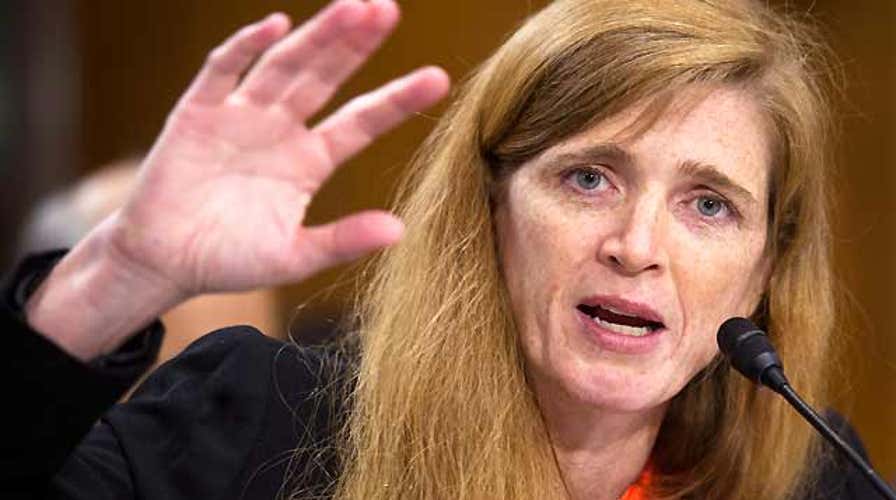President's pick for UN ambassador faces tough questions
National security correspondent Jennifer Griffin reports from the Pentagon
U.N. ambassador nominee Samantha Power faced a largely friendly audience at her confirmation hearing on Wednesday, but had a rocky and at-times awkward exchange with Sen. Marco Rubio as he pressed her on past comments suggesting the U.S. should apologize for its "sins."
The Florida Republican repeatedly asked Power for examples of crimes "committed or sponsored" by the United States.
Her response was that "the United States is the greatest country on earth" and she "would never apologize for America."
Rubio, pausing, said: "So your answer to whether we committed or sponsored crimes is that the United States is the greatest country on earth."
Power ultimately did not say whether she thought the U.S. has committed crimes. Instead, she cited "mistakes" like the abuse at the Abu Ghraib prison in Iraq. She also cited her past criticism of the Clinton administration's inaction with regard to the Rwandan genocide.
Power made the disputed comments in a 2003 New Republic magazine article, saying American foreign policy needs a "historical reckoning" which would entail "opening the files" and "acknowledging the force of a mantra we have spent the last decade promoting in Guatemala, South Africa, and Yugoslavia."
Though she did not revisit those themes during her hearing before the Senate Foreign Relations Committee, she was apparently referring to past U.S. support for oppressive regimes. The comments angered some lawmakers, though, since she also seemed to draw a comparison to Nazi Germany.
She said: "Instituting a doctrine of the mea culpa would enhance our credibility by showing that American decision-makers do not endorse the sins of their predecessors. When (German Chancellor Willy) Brandt went down on one knee in the Warsaw ghetto, his gesture was gratifying to World War II survivors, but it was also ennobling and cathartic for Germany. Would such an approach be futile for the United States?"
At her hearing on Wednesday, Power backed off some of her prior comments.
Asked by Rubio if she would have said the above passage differently if given the chance, she said, "indeed."
She also distanced herself from past remarks in which she recommended the U.S. send a "mammoth protection force" to bring order to the Arab-Israeli conflict.
"I have disassociated myself from those comments many times," she said, describing it as a "remarkably incoherent response" to a question she shouldn't have answered.
Mostly, senators at the confirmation hearing on Wednesday voiced support for Power.
Chairman Bob Menendez, D-N.J., said any criticism means "you must be doing something right."
"I don't believe that anyone can question your credentials," he said.
Sen. Tim Kaine, D-Va., said her propensity for making bold comments could help at the United Nations. "I think the U.N. could use a lot more blunt and outspoken," he said.
Power's opening statement expressed strong support for Israel and strong criticism of the way the U.N. works.
She said the U.S. "has no greater friend in the world than" Israel and slammed the U.N. General Assembly and Human Rights Council for its obsession with passing anti-Israel resolutions.
"I will stand up for Israel and work tirelessly to defend it," she said.
She also scorched the U.N. Security Council for its dawdling on Syria as the Assad regime commits "atrocities" against its people.
She described the U.N. response as a "disgrace that history will judge harshly."
Power is a former White House adviser and journalist/author who has written extensively about human rights abuses and genocide. She won the Pulitzer Prize for her 2002 book on genocide called "A Problem from Hell." She also advised Obama during the 2008 presidential primary campaign.
If confirmed, Power would replace former ambassador Susan Rice at the U.N.





